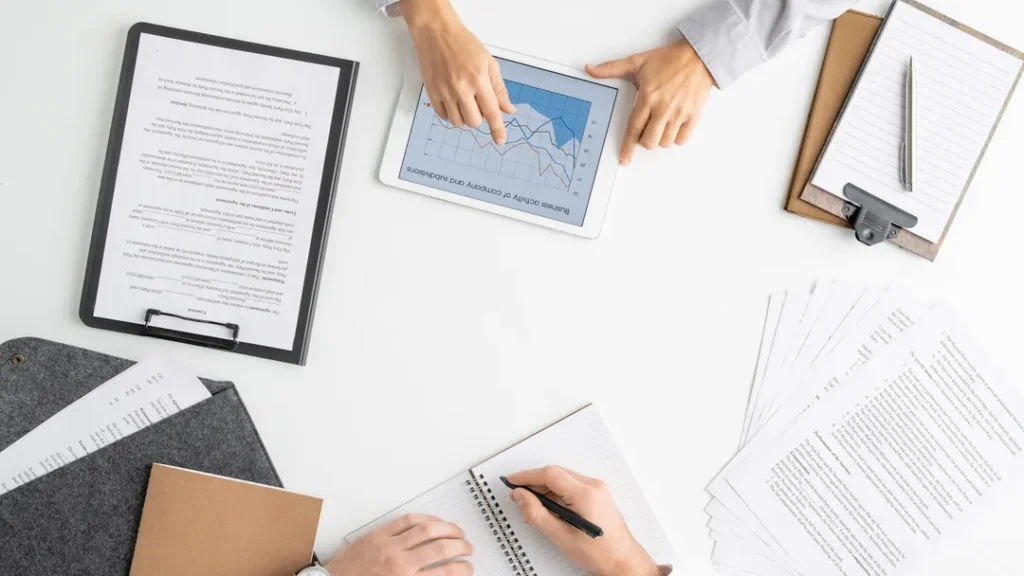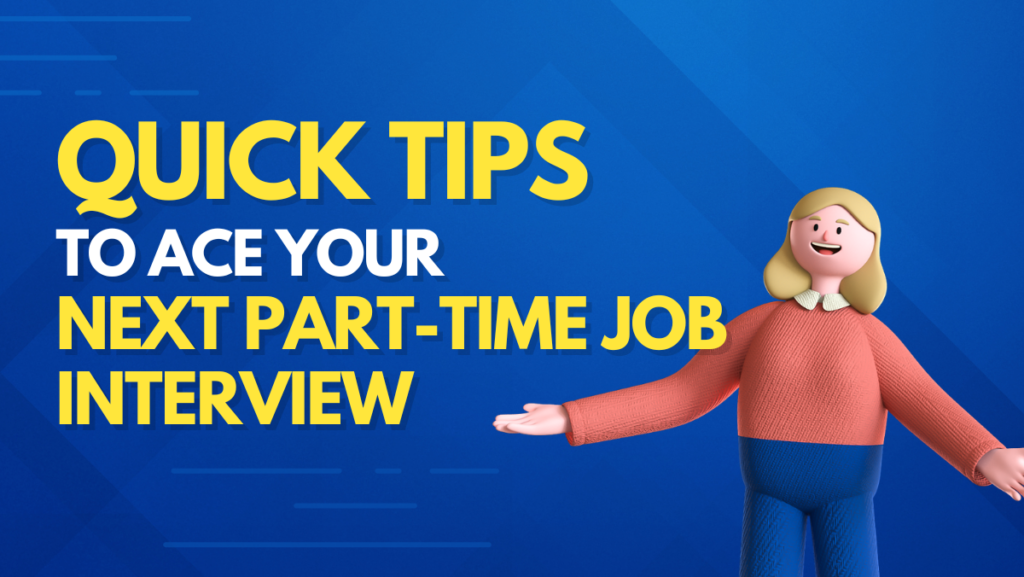Table of Contents
Landing a part-time job requires more than just submitting applications. Job seekers need to prepare for the crucial next step: the interview.
Job interview preparation doesn’t need to be complicated or time-consuming. Whether someone is a student looking to earn extra money, a recent graduate seeking temporary work, or someone between jobs, mastering some basic interview techniques can make the difference between getting hired or being passed over.
1) Research the company background
A job seeker should spend time researching the company’s mission and values before attending any interview. This preparation helps demonstrate genuine interest and engagement during the conversation. Learning about the organisation’s products, services and recent achievements gives candidates valuable talking points. They can find this information on the company website and social media profiles.
Job seekers can gain helpful insights by reviewing employee profiles on LinkedIn. This reveals the types of skills and backgrounds the company values in its team members. Understanding the company’s industry position and main competitors shows initiative. Candidates can mention relevant industry news or developments to showcase their knowledge.
Reading recent company news and press releases helps candidates stay current on important updates. They can reference these developments naturally during interview discussions. Researching the specific department or team enables candidates to ask thoughtful questions. This demonstrates their genuine interest in contributing to that area of the business.
2) Prepare answers to common interview questions
Job seekers should spend time practising answers to common interview questions before the big day. Writing down responses and rehearsing them aloud helps build confidence. A candidate needs to prepare for questions like tell me about yourself and why do you want this job. Their answers should focus on relevant skills and experience that match the position.
When practising responses, job seekers should keep answers brief and focused. Each response should last about 1-2 minutes and highlight specific examples from past work or school experiences. Candidates must tailor their responses to show how they fit the organisation and role. This means researching the company beforehand and understanding its values and needs.
It’s helpful to use the STAR method (Situation, Task, Action, Result) when answering behavioural questions. This structure helps candidates give clear, organised responses about past experiences. Mock interviews with friends or family members can provide valuable practice. This helps job seekers get comfortable speaking their answers out loud and receiving feedback.
3) Practice active listening skills

Active listening helps job seekers stand out during interviews. It shows respect for the interviewer and proves strong communication abilities. Good active listening skills include maintaining eye contact, nodding at key points, and giving the speaker full attention. These behaviours demonstrate engagement and interest in the conversation.
Candidates should remove distractions before the interview starts. This means putting mobile phones on silent and finding a quiet space for virtual interviews. One effective technique is to summarise what the interviewer has said before responding to questions. This shows understanding and helps avoid misinterpretation.
Role-playing mock interviews with friends or family members helps develop these skills. The practice builds confidence and makes active listening feel more natural during real interviews. Asking thoughtful follow-up questions proves engagement with the conversation. It also helps candidates gather important details about the role and company.
4) Show enthusiasm and positivity
A positive attitude and genuine enthusiasm can set a candidate apart in a part-time job interview. Showing enthusiasm during interviews helps demonstrate real interest in the role and company. Job seekers can start by arriving with a warm smile and maintaining good eye contact. A firm handshake and upright posture also help convey confidence and eagerness.
Asking thoughtful questions about company projects and future plans shows proactive interest. Candidates should focus on how they can contribute to the organisation’s success. Even introverted candidates can boost their energy levels whilst staying true to their personality. There’s no need to act overly bubbly – authentic enthusiasm is most effective.
Candidates should maintain positive body language throughout the interview. Nodding occasionally, leaning slightly forward, and staying engaged in the conversation signals interest and attentiveness. Speaking with genuine passion about past experiences and future goals helps create a memorable impression. Enthusiasm paired with preparation shows employers that candidates truly value the opportunity.
5) Ask insightful questions about the role
Asking thoughtful questions during an interview shows genuine interest and helps candidates understand if the position is right for them. Job seekers should ask about typical daily responsibilities to get a clear picture of what the role truly involves.
Questions about specific projects and challenges help reveal important details not mentioned in the job listing. It’s valuable to ask how the company measures success for the role. This demonstrates professional drive while providing insights into performance expectations.
Questions about training and development opportunities show long-term interest in growing with the organisation. This helps employers see the candidate as someone worth investing in.
Candidates should enquire about team dynamics and who they’ll work with directly. Understanding the workplace environment is crucial for part-time roles where fitting in quickly matters. Smart questions about upcoming projects or company goals indicate forward-thinking and enthusiasm. They also reveal potential challenges and opportunities in the role.
6) Follow up with a thank-you email
Sending a thank-you email after an interview shows professionalism and helps candidates stand out from other applicants. Job seekers should send this email within 24-48 hours of their interview. The email should be brief and specific. It needs to thank the interviewer for their time and reference key points from the conversation.
This personal touch demonstrates attention to detail and genuine interest in the role. Job seekers can boost their chances of getting hired by mentioning specific projects or company goals discussed during the interview. They should also reaffirm their enthusiasm for the position and explain why they would be a good fit.
A professional closing is essential. The candidate should end with a polite statement expressing their interest in hearing about the next steps. They must check their email for any spelling or grammar mistakes before sending. If the interview involved multiple people, candidates should send personalised thank-you emails to each interviewer. Each message should be unique and reference individual conversations.
Preparing for Common Questions

Part-time job interviews typically include specific questions about availability, work ethic and motivation. Strong answers demonstrate reliability and genuine interest in the role.
Building Your Answers
The best interview responses are brief but detailed. Candidates should prepare 2-3 examples that highlight their strengths for each common question. When asked about schedule flexibility, provide exact days and times of availability. Many employers prioritise candidates who can work evenings and weekends.
Key areas to prepare:
- Motivation for seeking part-time work
- Ability to balance other commitments
- Past experiences working in teams
- Problem-solving examples
Showcasing Relevant Experience
Even without direct work experience, candidates can highlight transferable skills from school, volunteering, or hobbies.
Focus on qualities that matter for part-time roles:
- Reliability
- Time management
- Customer service aptitude
- Ability to learn quickly
Use specific examples: “I organised three fundraising events at university whilst maintaining a full course load” demonstrates better time management than general statements about being organised.
Quantify achievements where possible. Numbers make experiences more concrete and memorable to interviewers.
Creating a Positive First Impression
Making a great first impression in a job interview starts before you walk through the door. Proper preparation and timing are essential elements that shape how interviewers perceive you from the start.
Dressing Appropriately
Professional attire shows respect for the interview process and demonstrates good judgement. Choose clothing one level above what employees typically wear at the workplace. For corporate settings, opt for pressed trousers or a skirt with a collared shirt or blouse. A blazer adds polish to the outfit. Clean, polished shoes matter just as much as the rest of the outfit. Avoid trainers or overly casual footwear. Keep accessories minimal and professional. A simple watch and small earrings are appropriate choices.
Arriving on Time
Punctuality demonstrates reliability and respect for others’ time. Plan to arrive 10-15 minutes before the scheduled interview time. Map the route in advance and check for potential delays like roadworks or public transport disruptions. Consider doing a practice run the day before.
Keep the interviewer’s phone number handy in case of unexpected delays. If running late, call immediately to explain the situation. Arriving early allows time to visit the toilet, check appearance, and collect thoughts before the interview begins.
Get Hired Today!
If you’re ready to take the next step in your job search, don’t wait! Start applying for part-time opportunities today and put these interview tips into action. A well-prepared interview can make all the difference, whether you’re:
- A student looking for extra income.
- A recent graduate seeking experience.
- Someone in between jobs wanting to gain new skills.
Take charge of your career today by visiting Jobshola to create your jobseeker profile and explore available positions. Employers searching for dedicated part-time staff can also register at Jobshola to connect with the right candidates.
Make every interview count and secure the right job opportunity now!
Frequently Asked Questions
Proper interview preparation combines thorough research, thoughtful responses, and professional behaviour to make a strong impression. Success depends on showing genuine interest while maintaining a composed and confident demeanour.



